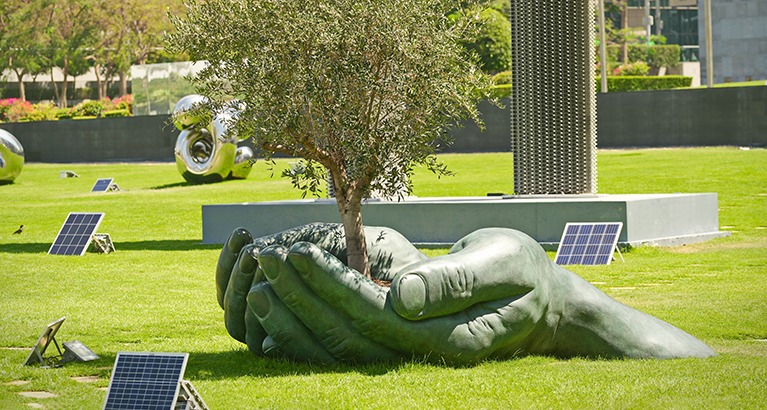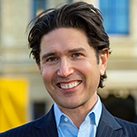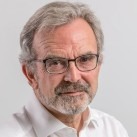The COP28 climate-change summit held in the United Arab Emirates concluded with a global agreement among nearly 200 nations that calls for “transitioning away from fossil fuels” in a “just, orderly and equitable manner” while greatly increasing renewable energy sources like solar and wind power.
People associated with Cambridge Judge Business School who attended COP28 to offer their expertise included Christopher Marquis, Sinyi Professor of Chinese Management who authored a book on the B Corp movement and sustainability; Bob Hoogendoorn, who works at McKinsey and Company and is a member of the Alumni Council of Cambridge Judge; and David Pitt-Watson, Fellow and former Pembroke Professor at Cambridge Judge Business School who is deeply involved with sustainability issues.
Thoughts on COP28
Reflections from Professor Christopher Marquis
Biodiversity and proper agricultural practices are crucial aspects of climate change, but have largely been overlooked at past COP events – but not in 2023. These topics are increasingly at the top of the agenda of climate-change specialists, and with good reason, as the natural world holds the levers for possible solutions to this vexing issue.
While reducing carbon emissions is of course essential for battling global warming, there may have been ‘carbon tunnel vision’ that has prevented the natural world from taking centre stage. Food security is a sensitive topic in many countries, so perhaps there has been a reluctance to discuss these areas, but that reluctance seemed to dissipate at COP28 – where attendees examined such topics as the potential use of soil, peatlands and ocean kelp for carbon storage.
I attended several panels in Dubai that discussed how transforming food systems to be more climate friendly is a key element in reaching goals of the Paris Agreement – as panellists indicated that more than 25% of greenhouse gas emissions and 70% of biodiversity loss stem from food and agricultural production. One day at COP28 was dedicated to food and agriculture, and more than 130 countries pledged to integrate these topics into their climate plans. Yet climate change funding in these areas has so far been pretty meagre, so there’s a lot of room for improvement in this area.
I discuss many of these themes in my forthcoming book, The Profiteers, to be published in 2024 by Public Affairs, an imprint of Hachette Book Group. The book critiques aspects of our current economic system that allows business to profit in areas it shouldn’t, but also highlights a group of pioneers seeking to transform how business is conducted in order to advance circular economy and other principles that will help in the fight against climate change.
One day at COP28 was dedicated to food and agriculture, and more than 130 countries pledged to integrate these topics into their climate plans. Yet climate change funding in these areas has so far been pretty meagre, so there’s a lot of room for improvement in this area.
Reflections from Alumni Council member Bob Hoogendoorn (MFin 2019)
What stood out to me at COP28 was the diversity of attendants and the universal drive and energy to tackle the global climate problem and be part of the solution. Here are 3 key takeaways:
- We need to focus on the right part of the climate equation. Concentrate efforts towards phasing fossil fuels going into the equation, rather than channelling resources primarily to what comes out. Reducing emissions is important, but what is the net impact if investment in oil exploration is reaching an all-time high and fossil fuels still receive around $7tn in subsidies?
- Only a holistic solution will drive the shift to net zero. Net zero can only be achieved when all stakeholders are part of the solution, working with stakeholders rather than against and by also involving communities most affected by climate change.
- Money needs to go to the right places. Several new climate investment funds were launched during COP28, such as the ~$30bn Alterra and the ~$1bn Loss and Damage Fund, but the fundamentals of investing are still very focused on near-term returns ($ today is worth more than $ tomorrow), and that is where institutions like Cambridge Judge Business School can push the mindset for the benefit of the next generation.
Net zero can only be achieved when all stakeholders are part of the solution, working with stakeholders rather than against and by also involving communities most affected by climate change.
Reflections from Fellow and former Pembroke Professor David Pitt-Watson
The climate talks in Dubai are the 28th time the world’s nations have met to agree how we address this issue. It is the most pressing problem which humanity faces. 100,000 people turned up to the event, hosted on the site where the Expo 2020 was held. In addition, lots of companies, governments, universities and NGOs were presenting their wares – almost like a trade show.
Yet we still do not have a clear path which will lead us to a sustainable world. That is a real frustration, because the longer we delay, the more difficult it is to plan, and the more costly any transition will be. And of course, the failure to transition will have a potentially unbearable cost.
In the way of such an agreement are all the squabbles of global politics. Not least the sense from the nations of the Global South that it is the wealthy nation which have used up and continue to use up the planet’s ability to absorb greenhouse gases, and that they need to foot the bill for the damage done and the costs of transition.
Yet progress is slowly being made. In establishing common cause, setting up investment funds, defining how targets will be set and defined, how carbon credits are to be traded and so on. It is not fast enough. But it is progress.
Meantime business should surely be calling for more action, and taking action itself. As David Attenborough so eloquently pointed out to a group of financiers before a previous COP meeting in Scotland:
“During the space of a single human lifetime we have changed the planet so much that the benign stable conditions which underpinned both the growth of our civilisations and the trade and financial systems that you preside over, have ended”, adding: “The value we place on a stable natural world will ultimately determine its future. Do we invest in the practices which take us deeper into this crisis, or the solutions that could get us out of it?”
The value we place on a stable natural world will ultimately determine its future. Do we invest in the practices which take us deeper into this crisis, or the solutions that could get us out of it?
Related content
Marquis, C. (2020) Better business: how the B corp movement is remaking capitalism. New Haven and London: Yale University Press.
Marquis, C. (forthcoming) The Profiteers: How Business Privatizes Profits and Socializes Costs. PublicAffairs








